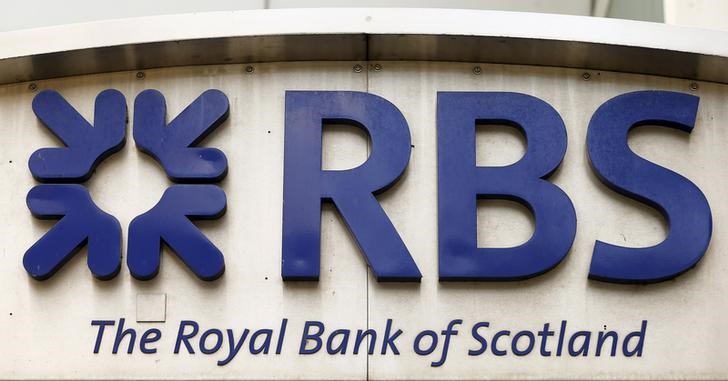By Steve Slater
LONDON (Reuters) - Britain took a 1.1 billion pound ($1.7 billion) loss on its first sale of shares in Royal Bank of Scotland (RBS) (L:RBS) on Tuesday, sparking accusations of poor timing from opposition politicians.
The UK government sold a 5.4 percent stake in RBS at 330 pence per share, a third below the price paid when Britain rescued the bank with 45.8 billion pounds of taxpayer cash at the peak of the 2007/09 financial crisis.
The move raised 2.1 billion pounds and is expected to be followed by several more sales. Overall, the government is sitting on a 15 billion pound loss on its holding, based on the current stock price and its average purchase price of 502 pence.
But the sale was more about starting the process of returning RBS to the private sector and showing investors the government is reducing its interference in the bank, rather than avoiding a loss, people familiar with the decision told Reuters.
"While the easiest thing to do would be to duck the difficult decisions and leave RBS in state hands, the right thing to do for the economy and for taxpayers is to start selling off our stake," Finance Minister George Osborne said.
But the opposition Labour Party slammed the sale.
"RBS had to be bailed out urgently, but it doesn't have to be sold off at the same speed," said Chris Leslie, its finance spokesman.
"The Chancellor (Osborne) needs to justify his haste in selling off a chunk of RBS while the bank is still awaiting a U.S. settlement for the mis-selling of sub-prime mortgages," Leslie added, referring to a potentially massive fine from U.S. authorities, related to RBS's past sales of U.S. mortgages.
RBS has set aside 2.1 billion pounds for a settlement but analysts estimate it could cost as much as 9 billion pounds, which has weighed on the stock.
The share sale, which cuts taxpayers' holding to 72.9 percent from 78.3 percent, marks a milestone in Britain's recovery from the financial crisis, and is part of Osborne's strategy to improve the country's finances.
MORE POWER
The move had been on the cards since Osborne in June accelerated the timetable for selling RBS, after his Conservative Party won May's national election with a surprise majority, giving his party more power in government.
He has lost no time since then in pressing on with his plans for Britain's economy, including the sale of more shares in Lloyds Banking Group (L:LLOY) and a budget that included a shift away from welfare spending to higher wages for workers.
Osborne aims to sell at least three quarters of its RBS holding, currently worth about 25 billion pounds, in the next five years.
UK Financial Investments (UKFI), the body that holds the stake, said it sold 630 million shares in a quick-fire sale to institutional investors after the market closed on Monday, slightly more than it had planned to sell.
The sources said other benefits of the sale are that it increases liquidity in the stock and shows there is investor appetite, particularly in Britain and the United States, which accounted for 85 percent of demand, one source said.
More and bigger sales to institutions are likely, but UKFI could also opt for a trading plan that involves small frequent sales in the market, or a sale to retail investors.
The 2.3 percent discount to RBS's closing price on Monday, at which the shares were sold, was narrower than the 3.1 percent discount on the government's first sale of Lloyds shares in September 2013.
At 1215 GMT, RBS shares were down 0.9 percent at 334.7 pence, outperforming a weak European banking index (SX7P).
Investors put in bids for 2.4 times more than the number of RBS shares sold by the government, a person familiar with the matter said.
RBS CEO Ross McEwan said he was pleased the sell-down had begun, adding it reflected the progress the bank had made "to become a stronger, simpler and fairer bank".
RBS was briefly the world's biggest bank by assets, but has more than halved its assets and the size of its investment bank and sold businesses around the world.
Britain has sold down its stake in Lloyds at a profit over the past two years and now holds less than 14 percent. The taxpayer could make at least 2 billion pounds on the Lloyds bailout, also at the height of the financial crisis.
The RBS sale was handled by Citigroup (N:C), Goldman Sachs (N:GS), Morgan Stanley (N:MS) and UBS (VX:UBSG).
